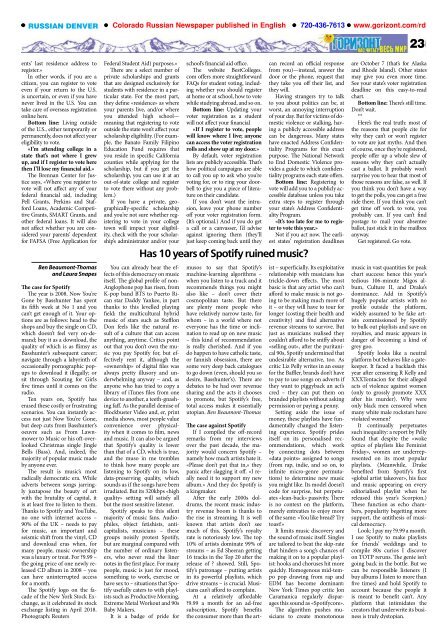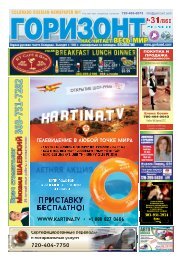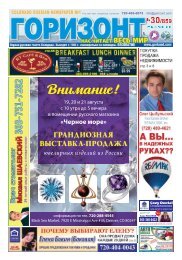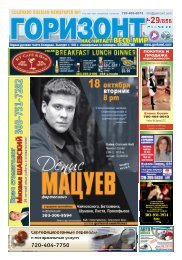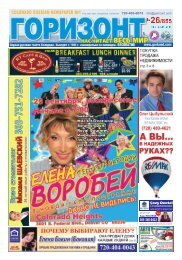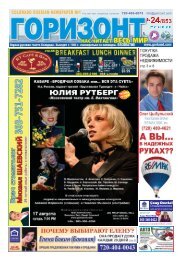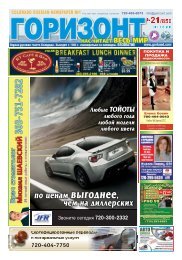Горизонт 38/963
Горизонт (газета) — (Gorizont англ. Horizon ) первая и наиболее влиятельная газета, издающаяся на русском языке в штатеКолорадо, США. Еженедельник, выходит по пятницам, формат Таблоид, 128 цветных и чернобелых страниц, распространяется в городах, составляющих метрополию Денвера (Большой Денвер), и в других населенных пунктах штата Колорадо от графства Саммит до графства Эль—Пасо. Полная электронная версия газеты «Горизонт» доступна в сети Интернет. Подробнее http://en.wikipedia.org/wiki/Gorizont_(newspaper)
Горизонт (газета) — (Gorizont англ. Horizon ) первая и наиболее влиятельная газета, издающаяся на русском языке в штатеКолорадо, США. Еженедельник, выходит по пятницам, формат Таблоид, 128 цветных и чернобелых страниц, распространяется в городах, составляющих метрополию Денвера (Большой Денвер), и в других населенных пунктах штата Колорадо от графства Саммит до графства Эль—Пасо. Полная электронная версия газеты «Горизонт» доступна в сети Интернет. Подробнее http://en.wikipedia.org/wiki/Gorizont_(newspaper)
You also want an ePaper? Increase the reach of your titles
YUMPU automatically turns print PDFs into web optimized ePapers that Google loves.
RUSSIAN DENVER<br />
Colorado Russian Newspaper published in English 720-436-7613 www.gorizont.com/rd<br />
23<br />
ents’ last residence address to<br />
register.»<br />
In other words, if you are a<br />
citizen, you can register to vote<br />
even if your return to the U.S.<br />
is uncertain, or even if you have<br />
never lived in the U.S. You can<br />
take care of overseas registration<br />
online here.<br />
Bottom line: Living outside<br />
of the U.S., either temporarily or<br />
permanently, does not affect your<br />
eligibility to vote.<br />
«I’m attending college in a<br />
state that’s not where I grew<br />
up, and if I register to vote here<br />
then I’ll lose my financial aid.»<br />
The Brennan Center for Justice<br />
says, «Where you register to<br />
vote will not affect any of your<br />
federal financial aid, including<br />
Pell Grants, Perkins and Stafford<br />
Loans, Academic Competitive<br />
Grants, SMART Grants, and<br />
other federal loans. It will also<br />
not affect whether you are considered<br />
your parents’ dependent<br />
for FAFSA (Free Application for<br />
Federal Student Aid) purposes.»<br />
There are a select number of<br />
private scholarships and grants<br />
that are designed exclusively for<br />
students with residence in a particular<br />
state. For the most part,<br />
they define «residence» as where<br />
your parents live, and/or where<br />
you attended high school—<br />
meaning that registering to vote<br />
outside the state won’t affect your<br />
scholarship eligibility. (For example,<br />
the Banato Family Filipino<br />
Education Fund requires that<br />
you reside in specific California<br />
counties while applying for the<br />
scholarship, but if you get the<br />
scholarship, you can use it at an<br />
out-of-state college and register<br />
to vote there without any problem.)<br />
If you have a private, geographically-specific<br />
scholarship<br />
and you’re not sure whether registering<br />
to vote in your college<br />
town will impact your eligibility,<br />
check with the your scholarship’s<br />
administrator and/or your<br />
school’s financial aid office.<br />
The website BestColleges.<br />
com offers more straightforward<br />
FAQs for student voting, including<br />
whether you should register<br />
at home or at school, how to vote<br />
while studying abroad, and so on.<br />
Bottom line: Updating your<br />
voter registration as a student<br />
will not affect your financial<br />
«If I register to vote, people<br />
will know where I live; anyone<br />
can access the voter registration<br />
rolls and show up at my door.»<br />
By default, voter registration<br />
lists are publicly accessible. That’s<br />
how political campaigns are able<br />
to call you up to ask who you’re<br />
voting for, or to ring your doorbell<br />
to give you a piece of literature<br />
on their candidate.<br />
If you don’t want the intrusion,<br />
leave your phone number<br />
off your voter registration form.<br />
(It’s optional.) And if you do get<br />
a call or a canvasser, I’d advise<br />
against ignoring them (they’ll<br />
just keep coming back until they<br />
can record an official response<br />
from you)—instead, answer the<br />
door or the phone, request that<br />
they take you off their list, and<br />
they will.<br />
Having strangers try to talk<br />
to you about politics can be, at<br />
worst, an annoying interruption<br />
of your day. But for victims of domestic<br />
violence or stalking, having<br />
a publicly accessible address<br />
can be dangerous. Many states<br />
have enacted Address Confidentiality<br />
Programs for this exact<br />
purpose. The National Network<br />
to End Domestic Violence provides<br />
a guide to which confidentiality<br />
programs each state offers.<br />
Bottom line: Registering to<br />
vote will add you to a publicly accessible<br />
database unless you take<br />
extra steps to register through<br />
your state’s Address Confidentiality<br />
Program.<br />
«It’s too late for me to register<br />
to vote this year.»<br />
Not if you act now. The earliest<br />
states’ registration deadlines<br />
Has 10 years of Spotify ruined music?<br />
are October 7 (that’s for Alaska<br />
and Rhode Island). Other states<br />
may give you even more time.<br />
See your state’s voter registration<br />
deadline on this easy-to-read<br />
chart.<br />
Bottom line: There’s still time.<br />
Don’t wait.<br />
**<br />
Here’s the real truth: most of<br />
the reasons that people cite for<br />
why they can’t or won’t register<br />
to vote are just myths. And then<br />
of course, once they’re registered,<br />
people offer up a whole slew of<br />
reasons why they can’t actually<br />
cast a ballot. It probably won’t<br />
surprise you to hear that most of<br />
those reasons are false, as well. If<br />
you think you don’t have a way<br />
to get the polls, you can get a free<br />
ride there. If you think you can’t<br />
get time off work to vote, you<br />
probably can. If you can’t find<br />
postage to mail your absentee<br />
ballot, just stick it in the mailbox<br />
anyway.<br />
Get registered. Go vote.<br />
Ben Beaumont-Thomas<br />
and Laura Snapes<br />
The case for Spotify<br />
The year is 2008. Now You’re<br />
Gone by Basshunter has spent<br />
its fifth week at No 1 and you<br />
can’t get enough of it. Your options<br />
are as follows: head to the<br />
shops and buy the single on CD,<br />
which doesn’t feel very on-demand;<br />
buy it as a download, the<br />
quality of which is as flimsy as<br />
Basshunter’s subsequent career;<br />
navigate through a labyrinth of<br />
occasionally pornographic popups<br />
to download it illegally; or<br />
sit through Scouting for Girls<br />
five times until it comes on the<br />
radio.<br />
Ten years on, Spotify has<br />
erased these costly or frustrating<br />
scenarios. You can instantly access<br />
not just Now You’re Gone,<br />
but deep cuts from Basshunter’s<br />
oeuvre such as From Lawnmower<br />
to Music or his oft-overlooked<br />
Christmas single Jingle<br />
Bells (Bass). And, indeed, the<br />
majority of popular music made<br />
by anyone ever.<br />
The result is music’s most<br />
radically democratic era. While<br />
adverts between songs jarringly<br />
juxtapose the beauty of art<br />
with the brutality of capital, it<br />
is at least free to listen to them.<br />
Thanks to Spotify and YouTube,<br />
no one with internet access –<br />
90% of the UK – needs to pay<br />
for music, an important and<br />
seismic shift from the vinyl, CD<br />
and download eras when, for<br />
many people, music ownership<br />
was a luxury or treat. For ?9.99 –<br />
the going price of one newly released<br />
CD album in 2008 – you<br />
can have uninterrupted access<br />
for a month.<br />
The Spotify logo on the facade<br />
of the New York Stock Exchange,<br />
as it celebrated its stock<br />
exchange listing in April 2018.<br />
Photograph: Reuters<br />
You can already hear the effects<br />
of this democracy on music<br />
itself. The global profile of non-<br />
Anglophone pop has risen, from<br />
K-pop band BTS to Puerto Rican<br />
star Daddy Yankee, in part<br />
thanks to this levelled playing<br />
field; the multicultural hybrid<br />
music of stars such as Stefflon<br />
Don feels like the natural result<br />
of a culture that can access<br />
anything, anytime. Critics point<br />
out that you don’t own the music<br />
you pay Spotify for, but effectively<br />
rent it, although the<br />
«ownership» of digital files was<br />
always pretty illusory and underwhelming<br />
anyway – and, as<br />
anyone who has tried to copy a<br />
library of iTunes files from one<br />
device to another, a teeth-gnashing<br />
faff. As the parallel demise of<br />
Blockbuster Video and, er, print<br />
media shows, most people value<br />
convenience over physicality<br />
when it comes to film, news<br />
and music. It can also be argued<br />
that Spotify’s quality is lower<br />
than that of a CD, which is true,<br />
and the muso in me trembles<br />
to think how many people are<br />
listening to Spotify on its low,<br />
data-preserving quality, which<br />
sounds as if the songs have been<br />
irradiated. But its 320kbps «high<br />
quality» setting will satisfy all<br />
but the most sensitive listener.<br />
Spotify speaks to this silent<br />
majority of music fans. Audiophiles,<br />
object fetishists, anticapitalists,<br />
musicians – these<br />
groups noisily protest Spotify,<br />
but are marginal compared with<br />
the number of ordinary listeners,<br />
who never read the liner<br />
notes in the first place. For many<br />
people, music is just for mood,<br />
something to work, exercise or<br />
have sex to – situations that Spotify<br />
usefully caters to with playlists<br />
such as Productive Morning,<br />
Extreme Metal Workout and 90s<br />
Baby Makers.<br />
It is a badge of pride for<br />
musos to say that Spotify’s<br />
machine-learning algorithms –<br />
when you listen to a track and it<br />
recommends things you might<br />
also like – don’t cover their<br />
cosmopolitan taste. But there<br />
are plenty more people who<br />
have relatively narrow taste, for<br />
whom – in a world where not<br />
everyone has the time or inclination<br />
to read up on new music<br />
– this kind of recommendation<br />
is really cherished. And if you<br />
do happen to have catholic taste,<br />
or fannish obsession, there are<br />
some very deep back catalogues<br />
to go down (even, should you so<br />
desire, Basshunter’s). There are<br />
debates to be had over revenue<br />
sharing and the acts it chooses<br />
to promote, but Spotify’s free,<br />
total access makes it essentially<br />
utopian. Ben Beaumont-Thomas<br />
The case against Spotify<br />
If I compiled the off-record<br />
remarks from my interviews<br />
over the past decade, the majority<br />
would concern Spotify –<br />
namely how much artists hate it.<br />
«Please don’t put that in,» they<br />
panic after slagging it off. «I really<br />
need it to support my new<br />
album.» And they do: Spotify is<br />
a kingmaker.<br />
After the early 2000s doldrums,<br />
the recent music industry<br />
revenue boom is thanks to<br />
the rise in streaming. It is well<br />
known that artists don’t see<br />
much of this. Spotify’s royalty<br />
rate is notoriously low. The top<br />
10% of artists dominate 99% of<br />
streams – as Ed Sheeran getting<br />
16 tracks in the Top 20 after the<br />
release of ? showed. Still, Spotify’s<br />
patronage – putting artists<br />
in its powerful playlists, which<br />
drive streams – is crucial. Musicians<br />
can’t afford to complain.<br />
At a relatively affordable<br />
?9.99 a month for an ad-free<br />
subscription, Spotify benefits<br />
the consumer more than the artist<br />
– superficially. Its exploitative<br />
relationship with musicians has<br />
trickle-down effects. The most<br />
basic is that any artist who can’t<br />
afford to make music is not going<br />
to be making much more of<br />
it – or they will have to tour for<br />
longer (costing their health and<br />
creativity) and find alternative<br />
revenue streams to survive. But<br />
just as musicians realised they<br />
couldn’t afford to be sniffy about<br />
«selling out», after the puritanical<br />
90s, Spotify undermined that<br />
undesirable alternative, too. As<br />
critic Liz Pelly writes in an essay<br />
for the Baffler, brands don’t have<br />
to pay to use songs on adverts if<br />
they want to piggyback an act’s<br />
cred – they can put them on<br />
branded playlists without asking<br />
permission or paying a penny.<br />
Setting aside the issue of<br />
money, these playlists have fundamentally<br />
changed the listening<br />
experience. Spotify prides<br />
itself on its personalised recommendations,<br />
which work<br />
by connecting dots between<br />
«data points» assigned to songs<br />
(from rap, indie, and so on, to<br />
infinite micro-genre permutations)<br />
to determine new music<br />
you might like. Its model doesn’t<br />
code for surprise, but perpetuates<br />
«lean-back» passivity. There<br />
is no context on the platform,<br />
merely entreaties to enjoy more<br />
of the same: «You like bread? Try<br />
toast!»<br />
It limits music discovery and<br />
the sound of music itself. Singles<br />
are tailored to beat the skip-rate<br />
that hinders a song’s chances of<br />
making it on to a popular playlist:<br />
hooks and choruses hit more<br />
quickly. Homogenous mid-tempo<br />
pop drawing from rap and<br />
EDM has become dominant:<br />
New York Times pop critic Jon<br />
Caramanica regularly disparages<br />
this sound as «Spotifycore».<br />
The algorithm pushes musicians<br />
to create monotonous<br />
music in vast quantities for peak<br />
chart success: hence this year’s<br />
tedious 106-minute Migos album,<br />
Culture II, and Drake’s<br />
dominance. Add in Spotify’s<br />
hugely popular artists with no<br />
profile outside the platform,<br />
widely assumed to be fake artists<br />
commissioned by Spotify<br />
to bulk out playlists and save on<br />
royalties, and music appears in<br />
danger of becoming a kind of<br />
grey goo.<br />
Spotify looks like a neutral<br />
platform but behaves like a gatekeeper.<br />
It faced a backlash this<br />
year after censoring R Kelly and<br />
XXXTentacion for their alleged<br />
acts of violence against women<br />
(only to grossly promote XXX<br />
after his murder). Why were<br />
only black men censored when<br />
many white male rockstars have<br />
violated women?<br />
It continually perpetuates<br />
such inequality: a report by Pelly<br />
found that despite the «woke<br />
optics of playlists like Feminist<br />
Friday», women are underrepresented<br />
on its most popular<br />
playlists. (Meanwhile, Drake<br />
benefited from Spotify’s first<br />
«global artist takeover», his face<br />
and music appearing on every<br />
editorialised playlist when he<br />
released this year’s Scorpion.)<br />
These function as echo chambers,<br />
popularity begetting more<br />
support, the antithesis of musical<br />
democracy.<br />
Look: I pay my ?9.99 a month.<br />
I use Spotify to make playlists<br />
for friends’ weddings and to<br />
compile 80s curios I discover<br />
on TOTP reruns. The genie isn’t<br />
going back in the bottle. But we<br />
can be responsible listeners (I<br />
buy albums I listen to more than<br />
five times) and hold Spotify to<br />
account because the people it<br />
is meant to benefit can’t. Any<br />
platform that intimidates the<br />
creators that underwrite its business<br />
is truly dystopian.


